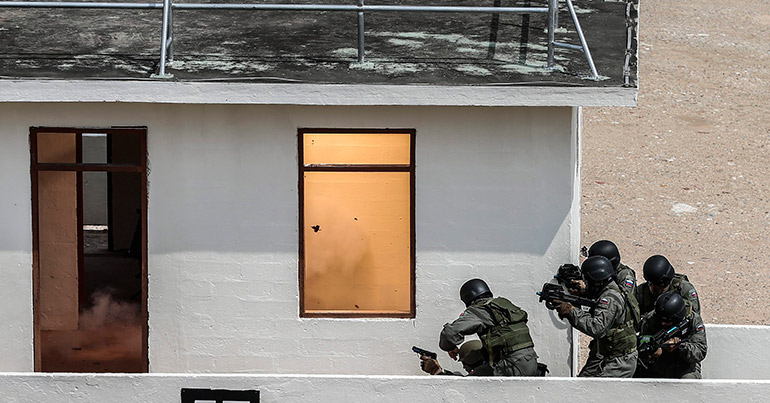ANALYSIS: After a planned attack on Marina Bay Sands was foiled, Singapore’s government is taking the fight to the Islamic State

The Singapore government has decided that it needs to participate in the coalition military efforts against the Islamic State (Isis). Officially, its reasons are that radical Jihadi terrorism is an ongoing problem, both globally as well as locally, and Singapore had to do its part in helping the global community eradicate it. Admittedly, its contribution to the war against Isis is relatively small: it commits no ground forces, but rather, a number of senior military planners working in the coalition’s operations centre.
The Singapore government recently altered its analysis of the threat of terrorism against Singapore, now arguing that a terrorist attack on the city-state is no longer a question of ‘if’, rather of ‘when’. In August, a plot to launch rocket attacks against Singapore’s Marina Bay Sands from the Indonesian island of Batam was uncovered, and authorities in Indonesia have since arrested a number of Indonesians who were allegedly involved in this plot. But with Singapore deciding to actively support the anti-Isis military efforts, many might question whether the city-state has just made itself a terrorist target.
Confusingly, the answer is both yes and no. Singapore’s Prime Minister Lee Hsien Loong admitted as much in August, when he said at the White House: “We are a target of Isis anyway. The JI [Jemaah Islamiyah] were looking for us before we did anything and before we knew they existed… If they see Indonesia and Malaysia as legitimate targets, all the more Singapore is a rational, open, cosmopolitan country, and not what they think countries should be, and therefore should be attacked. So do not think that by lying low, we are not going to be a target.”
As a country with a predominantly non-Muslim population located within a much larger, essentially Muslim region – even if the Muslim community was never monolithic – Singapore always stood out like a sore thumb. When the JI, a regional terrorist organisation based principally in Indonesia, proposed the establishment of a pan-Islamic caliphate in Southeast Asia, running as an arc from southern Thailand through the Indonesian archipelago and into the southern Philippines, Singapore would have been like a cancer to this geopolitical vision. That alone always made Singapore a potentially tempting target for terrorists operating in the Southeast Asia region.
It was probably no accident that the terrorists in Batam were planning to attack Marina Bay Sands. Not only is it one of the most prominent buildings in Singapore, it also represents to radical jihadists everything that is non-Islamic, indeed sinful, about Singapore. If their Southeast Asian affiliates had been able to successfully attack it, this could have been a significant morale boost for Isis.
Isis has been on the receiving end for some time now. The United States-led coalition and Russia have been launching air strikes against Isis facilities and key personnel. On the ground, it is being pushed back by a ragtag group of Kurdish peshmerga and indigenous Syrian resistance fighters, along with Turkish, Syrian and Iraqi military forces. Since Isis’ initial successes in carving out a piece of territory within Syria and Iraq, it has enjoyed almost no subsequent military successes.
In war, morale is as important, if not more so, as the physical ability to conduct military operations. In World War II, Jimmy Doolittle’s raid against Japan on 18 April 1942 did little actual damage to Japan, but it was a significant morale booster for the US. The morale boost that a successful attack against Marina Bay Sands would have engendered could have been strategically important. It does not necessarily result in victory for Isis in terms of its war objectives, but it could have rejuvenated its fighters to the cause.
Furthermore, Singapore is, even without a formal treaty of alliance, recognised as one of the United States’ most important strategic partners in the Asia-Pacific region. The US military often visits Singapore, and the city-state hosts a small but important US navy facility whose personnel were in 2002 allegedly the target of a planned JI attack, which was thwarted by the Singapore authorities.
However, Singapore’s participation in the war against Isis raises its profile. The size and nature of its contingent in the anti-Isis coalition is not the issue; its mere participation in the coalition, however, is. By joining the war against Isis, Singapore is effectively nailing its colours to the mast of the states currently engaged in fighting against the terror group. For the radical jihadists, therefore, Singapore can now be identified as an anti-Islamic state, and one that is worthy of a terrorist attack.
Bernard Loo Fook Weng is an associate professor at the S. Rajaratnam School of International Studies, Nanyang Technological University, Singapore. The views expressed here are strictly personal.

